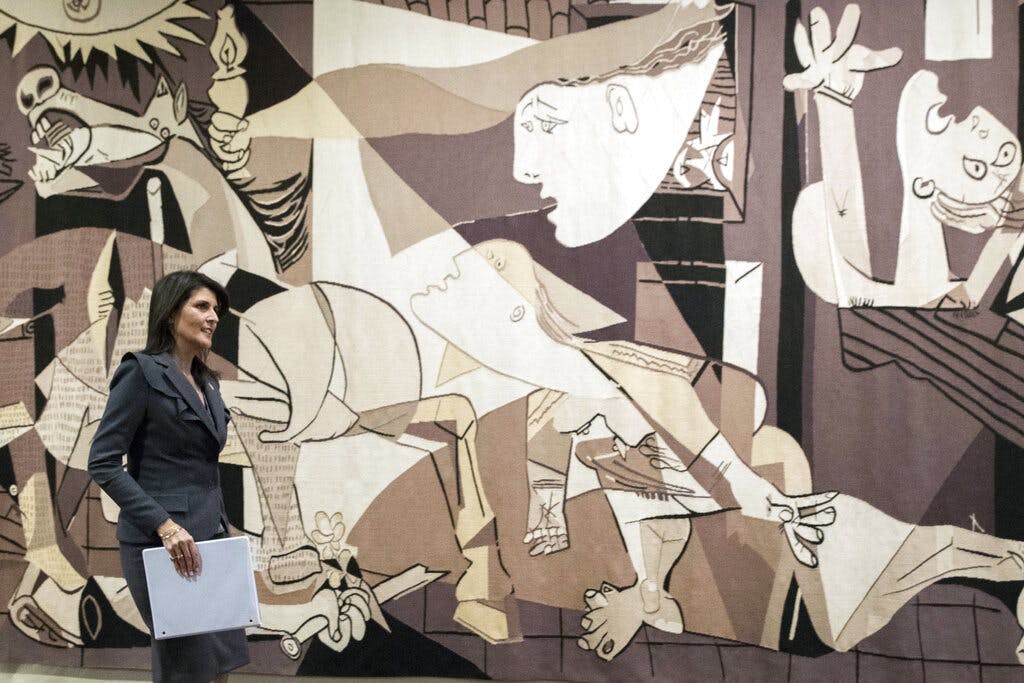Guernica II: Russian Bombing in Ukraine Echoes the Civil War in Spain and All It Meant
The mere mention of a 21st century version of World War II raises fears of a nuclear-laced clash among world powers. What if we’re following the footsteps of the democracies in the mid-1930s?

Fearing a ruinous global clash, democracies shrank from intervening militarily in the Spanish civil war. Historians now consider that a prelude to World War II. Sound familiar?
“The idea that we’re going to send in offensive equipment and have planes and tanks and trains going in with American pilots and American crews — just understand, don’t kid yourself, no matter what y’all say, that’s called World War III,” President Biden told supporters on Friday.
The mere mention of a 21st century version of World War II raises fears of a nuclear-laced clash among world powers. What, though, if rather than preventing, we’re just postponing such a war, as the democracies did in the mid-1930s?
Similar to what happened then, President Putin is urging Russia’s supporters from around the world to join his war, hoping to minimize the agony of mothers of his country’s conscript soldiers fighting a futile war and to maintain what little, if any, he has in the way of domestic support.
The Kremlin-connected Wagner Group, which pays mercenaries $2,100 a month, sent some 400 fighters to Ukraine — after recently lowering its recruitment standards to allow previously banned ex-cons to join. Additionally Moscow has recruited Syrian, Chechen, and other fighters, offering each up to $300 to join the war.
On the other side, President Zelensky said that some 16,000 foreign fighters joined Ukraine as an “international legion” — including a number of American war veterans. Local paramilitary troops, including the fascist Azov Group, are fighting on the Ukrainian side as well.
Yet, just as in the 1930s, the democracies that maintain, or can raise, standing armies are declining calls to confront militarily Mr. Putin’s assault on Kiev’s elected government. They shrink from drawing a line in what is becoming a fight between authoritarians and democrats. The West will not even signal a military response to reported Russian plans to use chemical weapons or commit other war crimes.
At the United Nations, a replica of Picasso’s “Guernica” hangs prominently as a constant reminder of an unacceptable act of war. The piece, one of modern art’s most famous, depicts the April 26, 1937, slaughter of man, woman, and animal when German and Italian aircraft razed the Basque town of Gernike.
The Spanish civil war was nearly a year old by then. That war started when a group of flag officers, led by General Francisco Franco, rebelled against the republic’s elected government. Soon enough fighters from around the world were gathering to help their ideological sides.
Franco’s Nationalists were bolstered by volunteers from places like Morocco, who were flown in by the Germans and Italians. The Italian fascist leader, Benito Mussolini, sent to Spain some 75,000 troops and the Nazi leader in Germany, Adolf Hitler, contributed 5,000 pilots to assure Franco’s ultimate victory.
On the other side, adventurists from democracies around the world volunteered to help the Republican side. War romanticism — as depicted in Ernest Hemingway’s writings — drew in liberals, fierce defenders of democracy, socialists, and communists. Clashing ideologies, including from communists, and differences with Spanish patriots often led to skirmishes among the ragtag groups of volunteers for the Republic.
In 1936 the world’s top powers signed a non-intervention pact. The Europeans and Americans stood by as war raged, though late in the war the American president, Franklin Delano Roosevelt, authorized some clandestine operations to help the Republicans.
Italy and Germany also signed the pact, but never ceased their military assistance of the Nationalists.
A historian at the London School of Economics, Paul Preston, writes, “The hesitant role played by decision-makers in Britain, France, and the United States during the Spanish war echoes the response of NATO regarding Ukraine.”
President Zelensky’s plea to impose a NATO no-fly zone over Ukraine was immediately rebuffed — as was Poland’s offer to send MiG29 fighter jets via America’s airbase in Germany. As Mr. Biden warns of World War III, he constantly tells the world — and Mr. Putin — what America would not do.
“We are self-deterred,” a retired Army colonel, David Maxwell, a recent instructor at the National War College, says. There are arguments against enforcing a no fly zone, he says, but “taking it off the table is wrong. Better to say we’d not rule it out. It may be counterintuitive, but the danger of escalation is greater when we say we won’t do something.”
Colonel Maxwell, now with the Foundation for the Defense of Democracies, also praises Mr. Biden’s constant release of intelligence — including, most lately, the disclosure that Moscow is asking Communist China for military help in Ukraine.
For whatever it’s worth, Beijing has denied such a request took place, but what is clear is that President Xi is watching Ukraine. One of the lessons he clearly internalizes is the reluctance of Western militaries to join the battle for the defense of a fellow democracy.
In the 1930s such a reluctance led Hitler, Mussolini, and Japan’s Hirohito to the belief they could launch a world war with impunity. When they did, our fight turned much more costly than if we had intervened earlier to aid the Spanish Republicans, dwarfing anything Picasso could have imagined.

